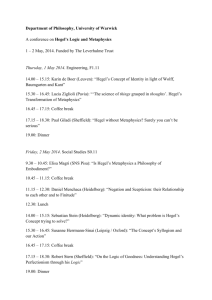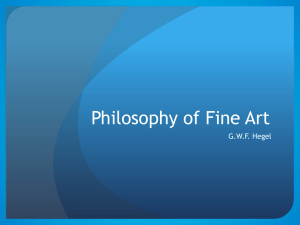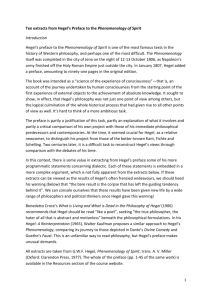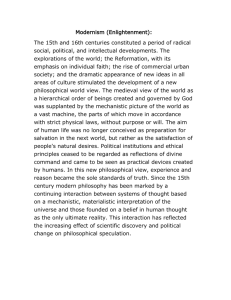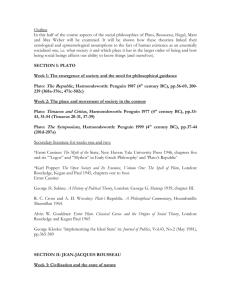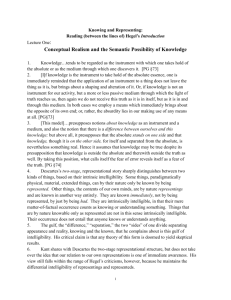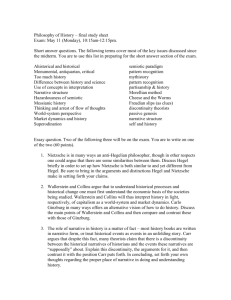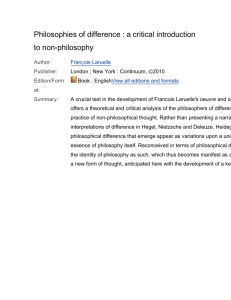Phil 544: Political Theory
advertisement
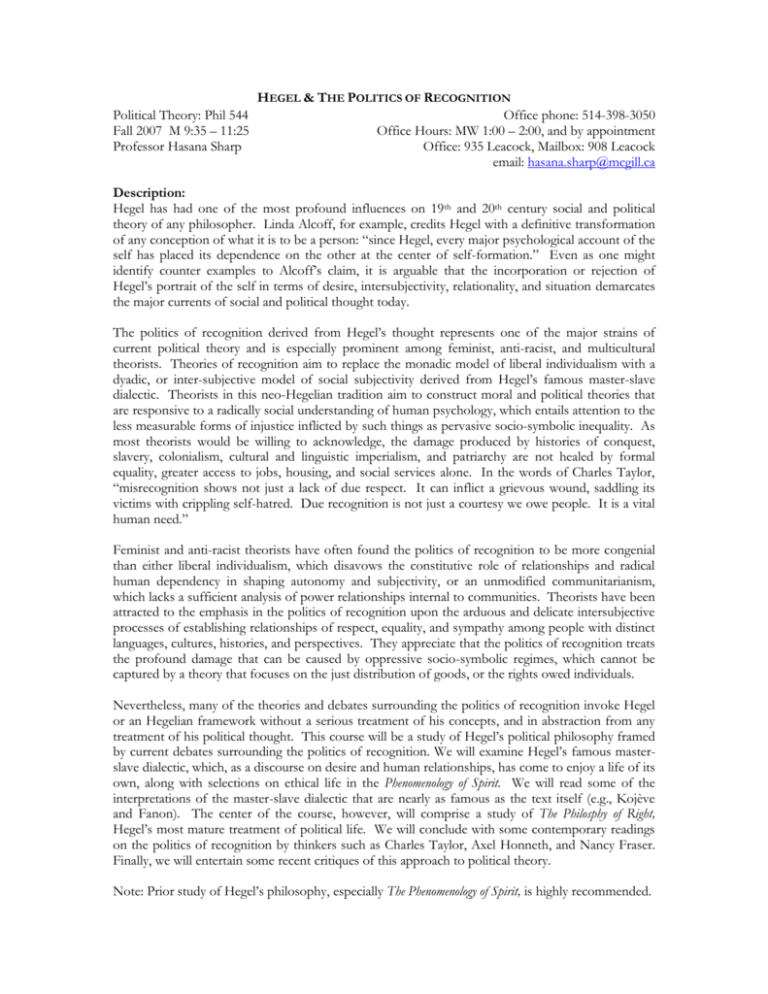
Political Theory: Phil 544 Fall 2007 M 9:35 – 11:25 Professor Hasana Sharp HEGEL & THE POLITICS OF RECOGNITION Office phone: 514-398-3050 Office Hours: MW 1:00 – 2:00, and by appointment Office: 935 Leacock, Mailbox: 908 Leacock email: hasana.sharp@mcgill.ca Description: Hegel has had one of the most profound influences on 19th and 20th century social and political theory of any philosopher. Linda Alcoff, for example, credits Hegel with a definitive transformation of any conception of what it is to be a person: “since Hegel, every major psychological account of the self has placed its dependence on the other at the center of self-formation.” Even as one might identify counter examples to Alcoff’s claim, it is arguable that the incorporation or rejection of Hegel’s portrait of the self in terms of desire, intersubjectivity, relationality, and situation demarcates the major currents of social and political thought today. The politics of recognition derived from Hegel’s thought represents one of the major strains of current political theory and is especially prominent among feminist, anti-racist, and multicultural theorists. Theories of recognition aim to replace the monadic model of liberal individualism with a dyadic, or inter-subjective model of social subjectivity derived from Hegel’s famous master-slave dialectic. Theorists in this neo-Hegelian tradition aim to construct moral and political theories that are responsive to a radically social understanding of human psychology, which entails attention to the less measurable forms of injustice inflicted by such things as pervasive socio-symbolic inequality. As most theorists would be willing to acknowledge, the damage produced by histories of conquest, slavery, colonialism, cultural and linguistic imperialism, and patriarchy are not healed by formal equality, greater access to jobs, housing, and social services alone. In the words of Charles Taylor, “misrecognition shows not just a lack of due respect. It can inflict a grievous wound, saddling its victims with crippling self-hatred. Due recognition is not just a courtesy we owe people. It is a vital human need.” Feminist and anti-racist theorists have often found the politics of recognition to be more congenial than either liberal individualism, which disavows the constitutive role of relationships and radical human dependency in shaping autonomy and subjectivity, or an unmodified communitarianism, which lacks a sufficient analysis of power relationships internal to communities. Theorists have been attracted to the emphasis in the politics of recognition upon the arduous and delicate intersubjective processes of establishing relationships of respect, equality, and sympathy among people with distinct languages, cultures, histories, and perspectives. They appreciate that the politics of recognition treats the profound damage that can be caused by oppressive socio-symbolic regimes, which cannot be captured by a theory that focuses on the just distribution of goods, or the rights owed individuals. Nevertheless, many of the theories and debates surrounding the politics of recognition invoke Hegel or an Hegelian framework without a serious treatment of his concepts, and in abstraction from any treatment of his political thought. This course will be a study of Hegel’s political philosophy framed by current debates surrounding the politics of recognition. We will examine Hegel’s famous masterslave dialectic, which, as a discourse on desire and human relationships, has come to enjoy a life of its own, along with selections on ethical life in the Phenomenology of Spirit. We will read some of the interpretations of the master-slave dialectic that are nearly as famous as the text itself (e.g., Kojève and Fanon). The center of the course, however, will comprise a study of The Philosphy of Right, Hegel’s most mature treatment of political life. We will conclude with some contemporary readings on the politics of recognition by thinkers such as Charles Taylor, Axel Honneth, and Nancy Fraser. Finally, we will entertain some recent critiques of this approach to political theory. Note: Prior study of Hegel’s philosophy, especially The Phenomenology of Spirit, is highly recommended. Texts: Hegel, The Phenomenology of Spirit. (brief selections) Hegel, The Philosophy of Right. Plus readings that will be available on WebCT. Available at “The Word” Bookstore at 469 Milton Street. This Class is supported by WebCT Vista. Requirements: Evaluations will be based upon in class participation (10% of grade), one short paper (5 pp.) presented in class (30% of grade), and one term paper (15-25 pp.) (60% of grade). Late papers will be penalized. Short paper/ presentation: You should isolate a controversial or difficult concept or issue from the reading due for that day and explicate it critically. Your aim should be primarily (1) to produce a rich and subtle understanding of what is at stake in the concept or issue, but also (2) to make suggestions about its promise or limits with respect to political theory more generally, and (3) to pose some questions that the class might discuss collectively. You do not have to answer all of the questions raised by what you pick out from the reading. Your task is to discover what might be surprising, problematic, or interesting about something in the text. Your task is not to demonstrate mastery of the material. Rather, you want to engage in critical analysis and provoke discussion. Since the paper is short, you should pick something very specific and focus on it. Yet, since you don’t have to answer all of the questions it raises, you should choose something sufficiently complex with which we can tarry a while. Ultimately, you want to say something that clarifies the often extremely opaque words of Hegel and that solicits discussion. (limit: 1,500 words) Term paper: You will choose your topic, which must treat the course material in a meaningful way. You must discuss Hegel in your paper, but you are not required to focus exclusively on the thinkers or texts we read in class. You should cite some of the course material, and your argument should reflect your thinking as it emerged in the class. If you propose a topic, outline, or abstract in writing, I will do my best to give you feedback. If you do so near to the very end of the semester, likelihood of timely feedback is significantly diminished. Grading criteria for the term paper will be posted on WebCT. (4,5000 – 7,500 words, please do not exceed outer limit) Seminars are open only to graduate students and final year Philosophy Majors, Honours and Joint Honours students, except by written permission of the Department.


